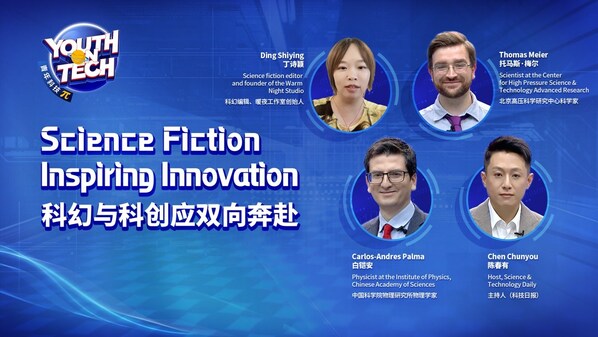CHENGDU, China, Oct. 26, 2023 /PRNewswire/ -- The 81st World Science Fiction Convention concluded in Chengdu in Sichuan, northwest China, on October 22. Chengdu became the second city in Asia and the first in China to host the convention attended by sci-fi fans and industrial insiders from across the world.
Sci-fi has always been a popular genre worldwide, providing inspiration for innovation and progress. Though it has been two centuries since the first sci-fi literature was created, its popularity remains unabated. What makes it such an enduring global phenomenon? How do sci-fi and science and technology influence each other? Three experts shared their insights in recent Youth on Tech hosted by Science and Technology Daily (S&T Daily).
A window to future world
A lot of new products and technologies that people enjoy today trace their origins to the realm of sci-fi such as mobile phones, 3D printing, automation, real-time translation and video calls. These have enriched modern life, making it intelligent.
"Sci-fi is the first outlet to imagine the future world, through which people participate in this process of innovation," said Carlos-Andres Palma, a physicist at the Institute of Physics, Chinese Academy of Sciences.
According to Thomas Meier, a German scientist at the Center for High Pressure Science & Technology Advanced Research, a unique function of sci-fi is to produce future talent in science, technology, engineering and mathematics. This is what society needs for sustainable growth.
When Meier was in high school, he read Jules Verne's classic Journey to the Center of the Earth, where a group of geologists want to find out what lies at the center of the earth. It inspired him, making him decide to study physics in university. Today, as a specialist in high pressure science, he simulates and studies the behavior of matter under high pressure in the laboratory, trying to know about the evolution of the earth better.
Sci-fi as a catalyst
Sci-fi has already been focusing on the issues people are experiencing today, such as artificial intelligence, energy crisis and climate change.
Ding Shiying, science fiction editor and founder of the Warm Night Studio, said people could make better choices to deal with such problems based on the sci-fi strategies they have seen or read about. Ding, whose work involves sci-fi book production and communication, emphasized the need for environmental sustainability. She hoped sci-fi would provide people remedial knowledge in the face of environmental issues.
According to Palma, sci-fi has become a very important tool for science popularization because it inspires people to learn about the scientific logic behind the scenes in the sci-fi world, and think how they could achieve such feats.
For example, some writers care about how cities will change in the future and where people will live at that time. So they imagine building a future city in space.
"It's not beyond reason to consider that future construction materials for such cities could be manufactured by robotic assemblers, harnessing CO2 to craft frameworks, similar to how plants grow," explained Palma. "The realization of such concepts may take at least two centuries, largely due to limited science investment, typically two percent of the world's GDP."
"Nevertheless, sci-fi serves as a catalyst, driving the public to engage in the scientific foundations of these imaginative processes and materials. In turn, citizens may find inspiration to advocate for increased investment in scientific advancements for peace and prosperity. It's a feedback loop worth strengthening," added Palma.
Platforms for communication
Though sci-fi novels and films enjoy a conducive environment for their creation, their production volume is still not high, Ding pointed out.
A challenge in writing sci-fi is that it requires the author to have some technological background. American sci-fi maestro Isaac Asimov was a biochemist, while renowned British author Arthur C. Clarke was an engineer. So is award-winning Chinese author Liu Cixin.
To be able to produce influential and inspiring works, writers need to have a basic understanding of science, Meier said.
According to him, people outside the science community wanted to know what scientists are working on. So scientists could emerge from their labs and popularize science by giving talks or making short educational videos on social platforms.
Palma advocated promoting communication between scientists and sci-fi writers by linking the arts with the sciences and even building a network between citizens and scientists so that people could ask science-related questions to scientists and researchers. That would not only help sci-fi writers, but also improve public scientific literacy. Disruptive policies and programs should be created to foster this kind of communication.
However, Rome was not built in one day. It is also true for popularizing science and producing sci-fi because they are both challenging and it takes a long time to see their effects.
Ding had a message for the young people: "Sci-fi nurtures people's imagination and explorative spirit, while popular science translates this exploration into knowledge and understanding. Therefore, popular science or sci-fi is a path with endless possibilities."




